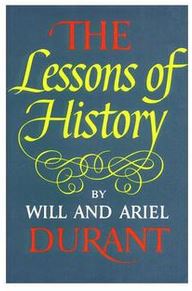Historiaren Lezioak
Historiaren Lezioak –
 Durantdar estatu batuarrek idatzi eta argitaratu zuten 11 liburukitan Zibilizazioaren Historia (The Story of Civilization) 1935 eta 1975 bitartean, nahiz azkenean soilik Napoleon Bonaparteren garaira iritsi, eta ez 20 mendera, asmo zuten bezala. 1968an argitaratu zuten nik orain irakurri dudan Historiaren Lezioak (The Lessons of History), labur emanaz bere urte askotako ikerketan ikasien ondorioak gizakion jardunaren inguruan. Ez da Biblia berria, baina merezi du irakurketak. Besteak beste hurrengo pasarte hau egin zait niri adigarri, zahar eta berrien arteko orekaz, borrokaz, gizartean (beherago ingelesezko jatorrizkoa):
Durantdar estatu batuarrek idatzi eta argitaratu zuten 11 liburukitan Zibilizazioaren Historia (The Story of Civilization) 1935 eta 1975 bitartean, nahiz azkenean soilik Napoleon Bonaparteren garaira iritsi, eta ez 20 mendera, asmo zuten bezala. 1968an argitaratu zuten nik orain irakurri dudan Historiaren Lezioak (The Lessons of History), labur emanaz bere urte askotako ikerketan ikasien ondorioak gizakion jardunaren inguruan. Ez da Biblia berria, baina merezi du irakurketak. Besteak beste hurrengo pasarte hau egin zait niri adigarri, zahar eta berrien arteko orekaz, borrokaz, gizartean (beherago ingelesezko jatorrizkoa):
Adimena beraz [intelektua] ezinbesteko indarra da historian, baina era berean izan liteke botere disolbatzaile eta suntsitzailea. Ehun ideia berritik, laurogeita hemeretzi edo gehiago eskasagoak izango dira ziurrenik berauek ordezkatu nahi dituzten erantzun tradizionalak baino. Inor, denik eta distiratsuen edo ongien informatua dela ere, ezin da heldu bizitza oso bakarrean halako ulermen maila osotara ziurtasunez epaitu eta baztertu ahal izateko norbere gizarteko ohiturak edo erakundeak, ezen hauek diren belaunaldien jakinduria pilatua, mendetako esperimentazioaren ondotik historiaren laborategian. Hala, horren baliagarria da aldaketari aurre egiten dion kontserbadorea, zein aldaketa proposatzen duen erradikala –agian hainbat baliagarriagoa, sustraiak nahitaezkoagoak diren neurrian txertoak baino–. On da ideia berriak entzunak izan daitezen, baliagarri gertatu litezkeen gutxi horien arrazoiz. Baina on da ere ideia berriak iragatera behartzea objekzioen, oposizioen eta mespretxuen errotatik. Horixe baita berrikuntzek iragan behar duten froga goriabaimenduak izan daitezen aurretik giza arrazan sartzeko. On da zaharrak gazteari eustea, eta gazteak zaharra bultzatu behar izatea. Tentsio horretatik sortzen da, nola sexuen eta gizarte klaseen arteko liskarretik, tentsio indar sortzailea, aurrerapen akuilatua, osotasunaren oinarrizko batasun eta mugimendu sekretua.
(Nire edizioko 35-36 orrialdeetan): Intellect is therefore a vital force in history, but it can also be a dissolvent and destructive power. Out of every hundred new ideas ninety-nine or more will probably be inferior to the traditional responses which they propose to replace. No one man, however brilliant or well-informed, can come in one lifetime to such fullness of understanding as to safely judge and dismiss the customs or institutions of his society, for these are the wisdom of generations after centuries of experiment in the laboratory of history / So the conservative who resists change is as valuable as the radical who proposes it—perhaps as much more valuable as roots are more vital than grafts. It is good that new ideas should be heard, for the sake of the few that can be used; but it is also good that new ideas should be compelled to go through the mill of objection, opposition, and contumely; this is the trial heat which innovations must survive before being allowed to enter the human race. It is good that the old should resist the young, and that the young should prod the old; out of this tension, as out of the strife of the sexes and the classes, comes a creative tensile strength, a stimulated development, a secret and basic unity and movement of the whole.


1935 eta 1975 artean, nahiz eta soilik Napoleon…ez dut gehiagorik irakurri.